|

 Shannon Mulder (BA ‘00), who teaches English at St. Charles (Ill.) North High School, got hooked on dance-athon fundraisers while attending The University of Iowa. She participated in the Hawkeyes’ 30-hour dance-athon for the Children’s Miracle Network, and brought the enthusiasm and the idea with her to St. Charles East six years ago. Shannon Mulder (BA ‘00), who teaches English at St. Charles (Ill.) North High School, got hooked on dance-athon fundraisers while attending The University of Iowa. She participated in the Hawkeyes’ 30-hour dance-athon for the Children’s Miracle Network, and brought the enthusiasm and the idea with her to St. Charles East six years ago.
Mulder co-founded the annual Project Dance!, a 12-hour-long dance-athon to raise money for the Illinois Special Olympics. This year, 135 participants committed to staying on their feet the entire time and through T-shirt sales, visitor donations, and pledges raised approximately $30,000 for the cause.
But it’s not just about the money. It’s about high school students dancing alongside Special Olympians. It’s about listening to the athletes speak out on stage about how much the games mean to them. It’s about teaching teens how to give back and how to appreciate all they have.
“Special Olympians deal with disabilities every day of their lives,” says Mulder. “Hours eight, nine, and 10 (of the dance-athon) are going to hurt, but it gives these students an idea of what they deal with every day.”
Students like Bethany Figura, a senior at St. Charles East who herself will be attending The University of Iowa this fall, danced her sophomore year, joined the executive board the following two years, and plans to participate in Iowa’s next year.
It’s for a great cause,” says Figura of Project Dance! “And to hear the Special Olympians speak first-hand makes it so much more meaningful, rather than just raising money and sending it off.”
Still the money it generates is instrumental in keeping the local chapter of the Illinois Special Olympics afloat. All of the chapter’s $330,000 annual budget is generated through donations, says Sandy Hutchins, area director of the Illinois Special Olympics. “And this is a huge event for us,” says Hutchins. “We’re just lucky enough to be the charity that benefits from it.” – Beacon News © 2007
Nick J. Sauers (BA ’00) is a K-4 principal at Wall Lake View Auburn’s elementary school.
Lisa Martin-Hansen (PhD ‘01) was awarded the 2007 Outstanding Teaching Award by Georgia State University College of Education.
Martin-Hansen has made substantial changes in the Ph.D. of Teaching and Learning in Science Education focusing student coursework and experiences in educational research and scholarship. She also revised Ed.S., M.Ed., and the MAT programs in science education with greater emphasis in embedding research in practice. She created templates for measuring student growth in these programs with data that are analyzed and reported regularly.
Her most recent publications have been published in Science & Education, The Science Teacher, and Science and Children, and she serves as a reviewer for the Journal of Research in Science Teaching and Science & Education. Her research line investigates active learning and cognitive change in K-16 science classrooms with emphasis in inquiry as part of the nature of science.
Sara D. Nash (BA ’03) is an art education specialist for UNO Charter Schools in Chicago, Illinois.
Meagan H. Gordon (BA ’06) teaches first grade at the Robert Crown Elementary School in Wauconda, Iowa.

Committed to Teaching
 Walsh's students benefit daily from his commitment to teaching.
Walsh's students benefit daily from his commitment to teaching.
|
Tim Walsh (BA ’03) teaches fourth grade at Ronzone Elementary in the Clark County School District of Las Vegas, Nevada. In his first year of full-time teaching, out of over 3,000 new educators, he was nominated for the CCSD New Teacher of the Year Award.
“Tim’s commitment to teaching is his strongest point,” said Michelle Walz who nominated him for the award. “He teaches his students the value of respect and builds a great rapport with his students.”
Because his classroom walls are covered in Iowa Hawkeyes and Chicago Bears memorabilia, you may think he’s a super fan. But when you take a closer look you see that almost every item has been hand crafted by his students.
“Simply put, Mr. Walsh’s students love being in his class,” Walz said, explaining how Walsh started receiving Bears articles, completely unsolicited, early in the year. Eventually he had to hint that he also likes many other types of sports. Immediately he began to receive Hawkeye items as well.
“When you have a teacher that combines the desire to improve with strong commitment to teaching and an incredible rapport with students you are lucky,” Walz said. “When that teacher is only in their first year, both with the district and in the profession, I am not sure what you call it, but it has to be recognized. Tim Walsh has brought such a strong example that others have already taken notice.”
|


Tim McGowan (MA ’92) was a counselor at Dakota Middle School when he was named the 2007 Rapid City (S.D.) Teacher of the Year. He now works with many former middle school students as a counselor at Central High School, where he enjoys taking time for students, and is clearly not afraid to follow his calling, wherever it takes him.
 Tim McGowan
Tim McGowan |
McGowan, who was also named the Region Seven Teacher of the Year, says counseling never entered his mind when he graduated from college with a science degree. During his third year of teaching ninth-grade science in the Minneapolis area, McGowan was pulled out of his regular classes for one hour per day to work with high-risk students. Then, three years later while he was an earth science teacher and head basketball coach in Colorado, he was again asked to work with kids struggling with academic and behavioral issues. The following fall, McGowan headed to The University of Iowa, where he earned his master’s degree in counseling and human development.
Despite the fact that counseling was not his original goal, McGowan took to it immediately. He said he sees counseling as simply taking time for kids. “In today’s world, everything is instantaneous. The only thing kids don’t have is time from someone else.”
As a counselor, McGowan believes his role is to teach students how to build relationships. He says that because of today’s technology—computers, blogging, text messaging—kids aren’t learning to communicate the way they used to. “Kids need to learn how to dialogue; they are ‘monologuers,’” he said.
McGowan’s unique graduate school experience prepared him well for his future as a school counselor. He worked with dental students, teaching them “how to be nice to their patients.” Although they had all the clinical skills to be successful, they did not know how to build a rapport with people. “Competence and compassion go hand in hand,” he stated.
Another experience that stands out for McGowan is the year he spent as education coordinator for the Black Hills Children’s Home in Rockerville. During that year, he learned the importance of educating the whole child.
“It takes the right heart, and the right head to do that,” he said.
In 1994, after a year in Hill City, McGowan moved to Dakota where he taught science until joining the counseling staff in 2001.
Dakota Middle School Principal Brad Tucker calls McGowan a “steady force that gets the job done, day in and day out.” With a counselor/student ratio of one counselor per 575 students, that is no easy task, but McGowan said he has approached it with humor in every opportunity.
McGowan enjoys counseling high school students. “There’s an energy that comes with that level: homecoming, plays, and talking about career goals.” – Rapids City Journal © 2007
 Winans named Teacher of the Year in North Richland, Texas.
Winans named Teacher of the Year in North Richland, Texas. |
Stacy Pfannebecker Winans (BA ’98), who teaches first grade, was selected Teacher of the Year for Binion Elementary, one of 21 elementary schools in the Birdville Independent School District of North Richland Hills, Texas.
“I have worked with Stacy for eight years and she puts her heart and soul into her career,” said first-grade teacher/colleague Jennifer Canizares. “She genuinely cares about the success of every student who comes into her classroom.”
Second-grade teacher/colleague Stephanie White agreed.
“Stacy is a great example of what a teacher should be,” White said. “She is so dedicated, she is even on the school’s PTA board. She teaches with such enthusiasm that it shows on her students’ faces even when they move on to second grade. Stacy is a great asset to our school and to children everywhere.”
 Margaret-Mary Sulentic Dowell
Margaret-Mary Sulentic Dowell |
Margaret-Mary Sulentic Dowell (PhD ’99) is an assistant professor at Louisiana State University, where she teaches in the Department of Educational Theory, Policy, and Practice. Having taught for 18 years in Iowa, Minnesota, and Mississippi, Sulentic Dowell is a career educator and was one of the first teachers in the nation to achieve National Board Certification in the area of early adolescence-English language arts. She has taught all public school grades except for kindergarten and eighth grade. As a former assistant professor and faculty service-learning fellow at the University of Southern Mississippi – Hattiesburg, she developed service-learning components in two required courses for teacher educators.
From 2002 to 2006, Sulentic Dowell served as assistant superintendent for elementary instructional services for the East Baton Rouge Parish School System, supervising 62 elementary sites located throughout the 465 square mile area.
She received the internationally recognized 2007 Kenneth S. Goodman “In Defense of Good Teaching” Award, named after Goodman for his advocacy efforts for teachers, political action, and holistic education. Sulentic Dowell, nominated for the award for her dedication to literacy efforts in the East Baton Rouge Parish School System and for her economic and social sacrifice in pursuing those efforts, says it is a huge reflection on other remarkable training, mentoring, and knowledge she gained while pursuing her degree at Iowa. “I truly credit not only my strong Iowa roots, but also the incredible influence of my dissertation advisor, Dr. Kathryn Whitmore,” she said. “I believe I came to her strong; she inspired me to excellence.”

 Mary Swenson Rettig (MA ‘80/PhD ’99) is Cornell College’s new director of college advancement. Mary Swenson Rettig (MA ‘80/PhD ’99) is Cornell College’s new director of college advancement.
Rettig has worked in higher education and financial services for the past 12 years, most recently at The University of Iowa Foundation, where she was director of development working primarily with the College of Nursing and the College of Pharmacy.
As director of college advancement at Cornell, Rettig plans and implements fundraising programs and manages the advancement staff.
 Mary Rettig
Mary Rettig |
“Mary’s experience and appreciation for a liberal arts education will help Cornell take great strides in securing the resources that can provide our students extraordinary opportunities,” said Peter Wilch, vice president for alumni and college advancement.
Vicki Ramseyer Morrow (BA ’89/MBA ’90) teaches mathematics and computer science at Plainfield North High School in Plainfield, Illinois.
After graduation, Morrow spent 15 years in consulting and corporate strategy at Lands’ End, Accenture, McDonald’s Corporation, and United Airlines. Two years ago, she decided to go back to her first love—teaching—and now she’s teaching at a new high school in her area and coaching the boys’ and girls’ diving teams at the Illinois Mathematics & Science Academy.
“I am finally ‘home,’” she writes, “as it doesn’t actually feel like work. I am so glad I made the decision to go back to education as it provides a level of personal satisfaction that I never achieved in the business world.”

Brandt Named Rehabilitation Counseling Alumni of the Year
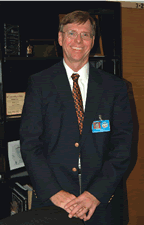 Oakdale Warden Lowell Brandt recognized as Alumni of the Year.
Oakdale Warden Lowell Brandt recognized as Alumni of the Year. |
L owell Brandt (BA 72/MA 79) never intended to get into corrections. Now he’s known as one of the best, most innovative wardens in Iowa.
“I’m just an Iowa farm boy who wanted to be a history teacher,” he said.
When Brandt didn’t immediately find work as a teacher, he accepted a position as a correctional officer at the Iowa Medical and Classification Center in Oakdale, which started him on a completely different, unexpected career path.
Now, more than 30 years later, he’s Oakdale’s warden, a position he’s held since 2004.
The Oakdale facility opened in 1969 as a psychiatric hospital. In 1984, it expanded with a 200-bed addition and became a reception site for the entire state. The facility has continued to grow on Brandt’s watch. In July, he hosted a ribbon-cutting ceremony for a 178-bed special needs unit. The prison now sees an average inmate population between 850 and 900 people and operates with a staff of 600 employees.
As warden, Brandt oversees everything from maintenance to security to personnel issues and budgeting. He says he uses his rehabilitation counseling knowledge as he approaches his inmates as a population with disabilities.
“There’s something that interferes with their ability to get a job,” he said, adding that rehab counseling is an inclusive field that addresses many of the issues his inmates have, including substance abuse, diversity, and medical concerns.
Brandt, who has been a member of the Rehabilitation Counseling program’s advisory board since its inception, earned the Alum of the Year award at the program’s 50 th anniversary celebration last spring.
Professor Vilia Tarvydas describes Brandt as the “backbone” to many of the program’s endeavors. “Lowell Brandt represents the best of our professional tradition,” she said.
Shelly Morelock (MA ‘92) sees Brandt as a role model, mentor, and innovative leader. She first worked with him in the 1980s when she was a correctional officer. She followed his advice, earned her master’s in rehab counseling, and is now a reentry coordinator for the Department of Corrections.
“He is loyal to helping corrections continue to grow and improve,” she said, citing programs Brandt started to offer inmates work opportunities within the prison and his focus on education and goal-setting for the inmate population.
“He has set it all up quietly without tooting his own horn,” Morelock said. “He helps people develop opportunities, be part of their own rehabilitation process, and have some hope.”
Brandt said guiding inmates to make changes in their lives helps him accomplish what he always wanted to do as a teacher.
“Good counselors don’t simply give advice, they help people figure out how to solve their own problems,” he said. “That’s a lot like being a teacher.”
Larry Brimeyer (MA ’74), a deputy director with the Iowa Department of Corrections and Brandt’s boss, said Brandt stands out among other wardens as a particularly compassionate, bright person.
“He cares so much about everyone,” Brimeyer said. “I admire the quality of his work. He is really a special person.”
|
 Thomas Haight (BBA ’71) stepped down as head swim coach at Seminole ( Florida) High School, after serving in that position for 24 years. He received the 2007 Coach of the Year and the National Interscholastic Swim Coaches Association’s Outstanding Service Award. He continues to teach business- and law-related courses. Formerly, Haight taught high school and coached swimming in Franklin Park, Ill., and Marshalltown, Iowa. Thomas Haight (BBA ’71) stepped down as head swim coach at Seminole ( Florida) High School, after serving in that position for 24 years. He received the 2007 Coach of the Year and the National Interscholastic Swim Coaches Association’s Outstanding Service Award. He continues to teach business- and law-related courses. Formerly, Haight taught high school and coached swimming in Franklin Park, Ill., and Marshalltown, Iowa.
Angela McCaffrey (BA ’72) is currently a clinical professor and director of clinics at Hamline University School of Law in St. Paul, Minn. After teaching fifth grade for one year, she earned a J.D. degree, and worked for three years at legal aid.
McCaffrey says she had an excellent teaching preparation at Iowa, including a student teaching semester at an inner-city school in Kansas City. “My preparation in educational psychology and elementary teaching methods is now very helpful as a law school teacher,” she said. “Most graduate and professional school teachers, such as law school teachers, have not had the advantage of that background. I think there is a great need in higher education for the basics that I was privileged to learn in my elementary education degree at Iowa.”
Bruce Anderson (MA ’72) retired after teaching 33 years as an elementary educator in Des Moines. Over the years, he taught in grades 2-6, and also taught other educators in central Iowa about “the sense of humor” through Heartland AEA, Des Moines Area Community College, and Drake University. He achieved National Board Certification in 1999. He also retired from the Iowa National Guard as a Lieutenant Colonel in 2000.
“The secret to successful teaching is to laugh every day!” he said.
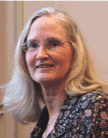 Margaret "Peg" Finders
Margaret "Peg" Finders |
Margaret “Peg” Finders (BA ’76/MA ’90/PhD ‘94) enjoys working with middle school students.
“It’s a time that they’re really alive with ideas and interests that can be explored in school,” she said.
But Finders, who taught 7 th grade language arts for 13 years, said middle school is also a time when students are lost. Those two feelings—love for the age group and a desire to reach students before they disconnect from education—have fueled Finders’ research and writing.
Now director of the School of Education and associate dean of the College of Liberal Studies at the University of Wisconsin-La Crosse, Finders has published three important books on literacy in middle school: Just Girls: Hidden Literacies and Life in Junior High, Literacy Lessons: Teaching and Learning with Middle School Students; and Language Arts and Literacy in the Middle School: Planning, Teaching and Assessing for Achievement.
Josephine Marsh, associate professor of Language and Literacy at Arizona State University, said Finders’ work is important to teachers, teacher educators, educational researchers, and doctoral students learning to conduct research.
“Her work pushes us to think beyond what is comfortable and acceptable in classrooms and to find ways to make school literacy relevant to today’s adolescent students and their future lives as citizens,” Marsh said.
Finders said she hopes her work spurs middle school teachers to understand the complexities of being in the middle school.
“I respect middle school teachers and middle school students,” she said. “I want to help these teachers reach their students,” she said.


Edward Castelein (BBA ‘62/MBA ’63) retired as manager/finance administrator at Cryovac Div. – Sealed Air Corp. in Cedar Rapids.
Gordon Cawelti (PhD ’62) is semi retired, continuing to serve education as a member of the Scientific Advisory Council of the Center of Innovation and Improvement in Illinois and as a member of the Kaplan University National Advisory Board. His Handbook of Research on Improving Student Achievement is in its third edition.
Orval Gingerich (BA ’68) is the assistant vice president for International Programs and director of the Center for Global Education at Augsburg College in Minneapolis. His background blends a broad experience in international and experiential education and administration. He has presented and written extensively on the topics of global citizenship, international education, and more recently, peace studies in the post-9/11 era.
Ruth Ann Burgy Muszynski (BA ’68) retired from her educational career in the Cedar Rapids Community Schools.
Fawcett Makes Learning Fun
Fellow second-grade teacher Mavis Butler describes Nancy Fawcett (BA ‘61) as talented, genuine, a joy, a gift, a wonder, even “the greatest.”
“She goes out of her way to make learning fun for kids and to be the best she can be,” Butler said.
Fawcett’s former principal, Glenn Connor, said he counts her as the best teacher he’s ever observed.
“If I had to pick a classroom to be in all day, hers would be the one,” he said. “You won’t find anyone more dynamic. She’s positive and has so much enthusiasm. Kids love her because her classroom is an exciting place.”
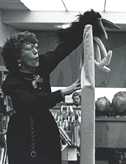
Fawcett demonstrates successful teaching methods using puppets. |
Fawcett, who retired in 1999 after nearly three decades teaching elementary school, was known for integrating puppetry and theater into her classroom.
A crow puppet named Scare presented spelling words. A character Fawcett took on known as Miss Meany ruled over handwriting lessons. Students learned fractions on Mustache Day, when Fawcett would don a fake mustache, chef’s hat, acquire a fake Italian accent, and teach her math lesson using paper pizza slices as a visual aid. The students all got their own mustaches, of course.
“Stimulating students’ imaginations and working on self esteem were important,” Fawcett said. “I thought using drama was a way to get to that.”
Fawcett’s own first taste of drama was as a second grader in Topeka, Kansas. She made up plays with her friends during recess and had a teacher, Miss Shellhorn, who allowed them to present them to the rest of the class.
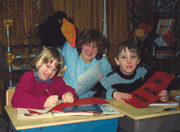
Fawcett and her Scare Crow help second graders prepare for a spelling test. |
“After we did these things, Miss Shellhorn said to me, ‘ Nancy, you’re going to be an actress some day.’ It was like a spell,” Fawcett said. “I always remembered how important that was and how those experiences stuck with me and what they did for my self esteem.”
Fawcett went on to study speech and drama at The University of Iowa. During her junior year, she switched her major to Elementary Education.
“I thought about what happens to students, why they get inhibited. I wondered what I could do about that,” Fawcett said.
In addition to creating a lively classroom experience for the hundreds of students she encountered at Fellows Elementary, Fawcett was active in Ames Children’s Theater and co-wrote a book called Imagination: At Play with Puppets and Creative Drama . She started a program called Project ACT (Ames Creative Teaching), which demonstrated ways for teachers to use drama and puppetry to enhance curriculum. She earned the UI Distinguished Teacher’s Award in 1989.
Fawcett continues to be active in the classroom. She performed puppet shows in the Sarasota, Florida, elementary schools for FACE, an organization that aids persons with facial abnormalities like cleft palates. She did a puppetry program with elementary students as part of a family concert for the Venice ( Florida) Symphony Orchestra, and has conducted puppetry workshops in talented and gifted classrooms and for local libraries.
Butler said she continues to be inspired by Fawcett’s creativity and generosity.
“She has so many, many ideas,” she said. “She encourages people to ‘be who you are, look for your light, and find out what really pleases you.’ And so often what pleases you brings not only gifts to your life, but to others’ as well.”
|


Margaret Fox (PhD ‘49), a UI professor emeritus, has always been a woman of adventure. One of few women pursuing an advanced degree in science at that time, she went on to teach anatomy, kinesiology, and physical education at the UI for 32 years.
Fox’s lifelong love of science has been paralleled by her passion for foreign travel and the enrichment that comes from learning about other cultures. She feels so strongly about an international education that she recently established the Dr. Margaret Fox Presidential Scholarship for Study Abroad, created to support UI students in their own international learning experiences.
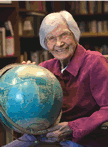
Margaret Fox |
In 1951 as an exchange teacher in England, she experienced cultural differences—such as having students stand when she entered the classroom. Before meeting the Queen Mother at a garden party, she was offered the choice to curtsy or not. “I felt it was important to honor the customs of the country I was visiting,” she said. “So, of course, I curtsied.”
The few opportunities to travel during her career only fueled her wanderlust; after retiring in 1980, she traveled in earnest, eventually making her way at least once to every continent over the course of 20 years.
“Every time I left, I came back a better American,” she said, “both appreciating and understanding who we are as a people, and more aware of the richness of other cultures—and the ways in which they contribute to our own.”
At 93, Fox continues to lead an active life in Iowa City, and believes the scholarship is an important thing for young people at the University. “It’s critical for students to have this experience at an age when having their own cross-cultural adventures can really change their lives—and maybe even change the world.” – by Betsy Hickok

|